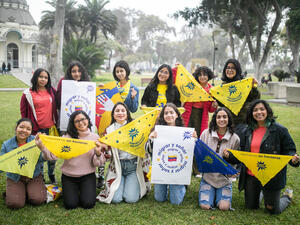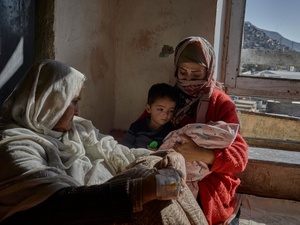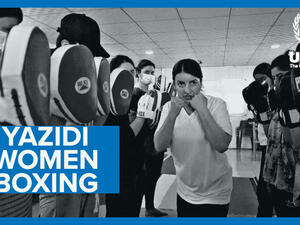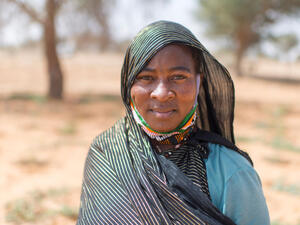UNHCR offers revised guidelines to combat violence against refugee women
UNHCR offers revised guidelines to combat violence against refugee women

UNHCR helping displaced Sri Lankans and returnees to discuss sexual and gender-based violence in Aruni.
GENEVA, Sept 19 (UNHCR) - The international community today applauded the UN refugee agency's new, revised guidelines for combating sexual and gender-based violence against displaced women and children, but stressed that these guidelines can only work if they are actually implemented in the field.
On Friday, UNHCR launched its new guidelines in a publication titled "Sexual and Gender-Based Violence against Refugees, Returnees and Internally Displaced Persons - Guidelines for Prevention and Response".
The 158-page book is a revision of the first edition published in 1995. While the original version focused on issues related to sexual violence like rape, the revised guidelines have been expanded to include other forms of gender-based violence like trafficking, domestic violence, female genital mutilation and demands for sexual favours in exchange for offers of services or assistance.
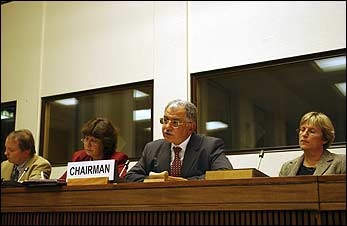
Assistant High Commissioner Kamel Morjane (second from right) launching the new, revised guidelines in Geneva.
"This is a milestone in a process to ensure better delivery of protection to refugee women and children," said Assistant High Commissioner Kamel Morjane, who presented the new publication in Geneva.
Calling for joint efforts with the humanitarian community to combat such violence, he added, "Ownership and usage of the revised guidelines do not rest solely with UNHCR. These guidelines are intended for use by all humanitarian and development partners working with refugees and other displaced populations."
The refugee agency is distributing the new guidelines to all staff worldwide and to key partners like governments, non-governmental organisations and other UN agencies. The publication will be translated into some other key languages to facilitate its use in the field.
The revision of the guidelines and field testing were funded by the United Nations Foundation at a cost of more than $2 million.
At the launch, Canada welcomed the document, calling it "timely" as it comes in the wake of alleged sexual abuse and exploitation of refugee women and girls in West Africa and Nepal.
UNHCR's Director for International Protection, Erika Feller, stressed, "The guidelines without effective implementation are nothing. Too often, there can be a gap between policy guidelines and their implementation."
Ambassador Fisseha Yimer, the current chairman of UNHCR's governing Executive Committee and the ambassador of Ethiopia, echoed Feller's concern: "In the final analysis, it has to be implemented in the field, not at headquarters. Follow-up is of course important at headquarters."
The Danish ambassador also recommended that the refugee agency set up a mechanism for reporting progress in implementation.
To test their applicability in the field, UNHCR piloted the new guidelines in 32 countries around the world prior to the launch. The agency sought feedback from partner agencies, refugee leaders and refugees themselves, incorporating their proposals into the final guidelines.
The new publication offers a wealth of practical advice on how to address the problem of sexual violence against refugee women and girls. It recommends that refugees participate centrally in the design and implementation of programmes to prevent and respond to sexual and gender-based violence. Such programmes include rights-awareness training among refugees and decision-makers in the camps. The book also offers tips on how to monitor and evaluate the effectiveness of these programmes.
In the event of such violence or abuse against women, the publication provides a form to standardise the reporting of such incidents. The guidelines also detail the various responses needed to help victims, including meeting the need for legal redress and providing access to medical and counselling support.
According to a World Bank report, at least one in every three women has been beaten, coerced into sex or otherwise abused in her lifetime. The International Organization for Migration (IOM) estimates that as many as 2 million women are trafficked across borders annually, while in Africa, more than 90 million women and girls are victims of female genital mutilation.



